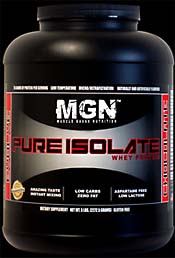 I know you will all sleep safer once I tell you about the recent consent agreement entered into between the Bureau of Industry and Security (“BIS”) and Muscle Gauge Nutrition as well as a related agreement between BIS and and one of the owners of Muscle Gauge Nutrition. The company agreed to pay BIS a civil penalty of $62,500 in connection with an attempted export to Iran valued at $93,000. The owner, Robert Reed, agreed to an individual civil penalty in the amount of $22,000.
I know you will all sleep safer once I tell you about the recent consent agreement entered into between the Bureau of Industry and Security (“BIS”) and Muscle Gauge Nutrition as well as a related agreement between BIS and and one of the owners of Muscle Gauge Nutrition. The company agreed to pay BIS a civil penalty of $62,500 in connection with an attempted export to Iran valued at $93,000. The owner, Robert Reed, agreed to an individual civil penalty in the amount of $22,000.
Did MGN and Reed ship centrifuges or accelerometers or other controlled items that might assist the Iranians in their production of nuclear weapons? No, they shipped — are you sitting down? — whey supplements for bodybuilders. Apparently you need people with really strong biceps to crank up those centrifuges to enrich uranium. That’s a little known fact that you first heard here. In fact, whey protein is arguably much more important to Iran’s efforts at nuclear proliferation than nail polish.
Of course, to put this whopping fine in further context, the whey supplements would have been eligible for a license under the Trade Sanctions Reform and Export Enhancement Act of 2000. Worse yet, the attempted exports occurred on June 30, 2011, yet in less than three months, under amendments adopted by OFAC to its rules effective October 12, 2011, these exports, as food products, would not have even required a license at all!
The fine probably can be seen, in addition to a valiant effort to protect our national security interest against Iranian bodybuilders, as a penalty imposed to punish the Company for being stupid and for making BIS mad. According to the charging documents linked above, the unfortunate incident started when MGN shipped to its freight forwarder the sales invoice for the order which showed the “bill to” party as a customer in Iran and the “ship to” party as a transportation logistics company in the UAE. The freight forwarder, which remarkably enough was paying attention here, noted the “bill to” customer and asked MGN for a license. MGN responded not by applying for the easily obtainable license but by telling the freight forwarder that the “bill to” was just a typo and that the UAE company should have been the “bill to” party as well. Accordingly, MGN supplied a new “corrected” invoice. The freight forwarder then apparently dropped the dime on MGN because the shipment was seized before it could add any muscle mass to any Iranians.
The owner, Robert Reed, was subject to an individual penalty because, according to the charging documents, he told a BIS agent investigating the shipment that the shipment was really intended to go to the UAE and not to Iran. That was probably a bad idea given that BIS apparently had unearthed an email (indeed had probably been given that email by the Company itself) from the company’s sales manager to Reed explicitly stating that the end user was in Iran. Oops.
 Permalink
Permalink
Copyright © 2012 Clif Burns. All Rights Reserved.
(No republication, syndication or use permitted without my consent.)

 Posted by
Posted by  Category:
Category: 

